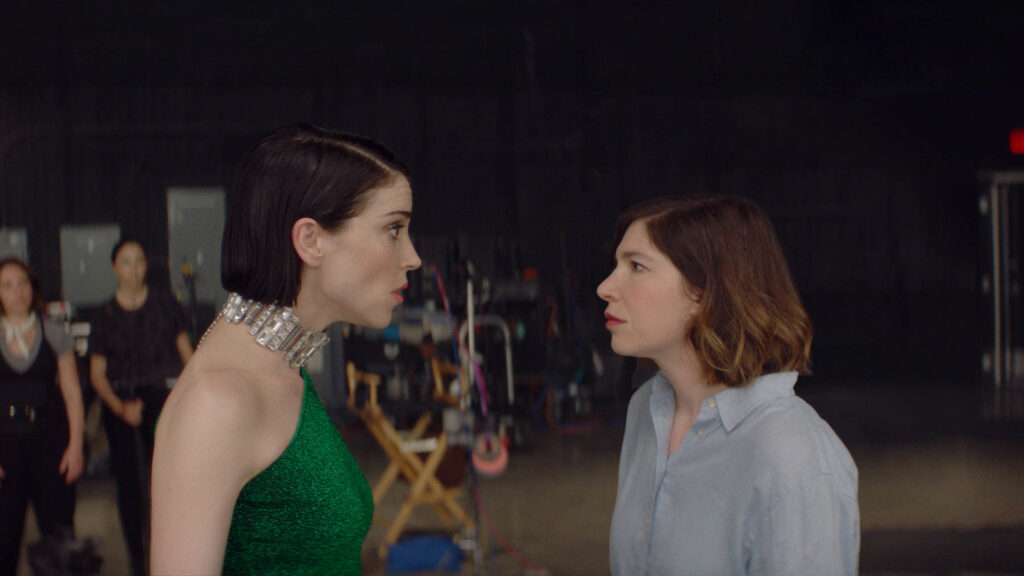A fascinating meta odyssey of rock stardom, Bill Benz’s “The Nowhere Inn” is a perfect antidote-turned-hallucinogenic for the festival’s opening night Taylor Swift documentary, “Miss Americana.” It raises a great question that not music documentaries do: “Just how boring are rock stars when they get off stage?” That’s the case with Annie Clark, known in rock music as St. Vincent when she’s behind a jagged red guitar and a neon stage design. Her friend Carrie Brownstein (of Sleater-Kinney, “Portlandia,” etc.) wants to make a documentary about St. Vincent, but is confronted with Annie’s more pedestrian behavior—eating radishes, going to bed early, non-rock star stuff. It leaves Carrie’s project at a standstill, and puts both of them into a crisis. Annie has to reconcile the difference between her persona on stage and off, and Carrie, unable to reconcile the preconceived notions she’s had of St. Vincent, starts to push Annie to be the large personality that she’s actually not.
The film’s meta elements go a long distance, especially as they reflect on aspects of their careers in a manner that’s particularly transparent. Clark reckons with her rock star presence while also her radish-eating side, and it’s funny and visceral. Brownstein reflects on being in a failure part of her career, and though she doesn’t color that thought with any real-life specific examples, it’s the kind of open discussion in the movie that gives “The Nowhere Inn” its soulful edge. In throwing themselves deep into this project (they co-wrote the script), St. Vincent and Brownstein provide compelling ideas that don’t concern just themselves, but the entire rock star universe. When getting sucked into “The Nowhere Inn,” it often feels like only St. Vincent and Brownstein have the audaciousness and clarity to do so.
Carrie’s interest in making the most rock ‘n roll St. Vincent documentary possible turns Annie into an amplified version of herself, a concept that knowingly starts like a hokey Eddie Murphy movie, and which Brownstein and Clark have a lot of fun with. St. Vincent starts acting more rehearsed, and later on starts planting candid moments for Carrie to document, as in a scene with Dakota Johnson that has Carrie hilariously uncomfortable, filming the two in bed. Like with an incredibly artificial and elaborate family scene about St. Vincent’s family, the movie builds different sequences while riffing on the artificially of the music business, and of music documentaries as well. Where does St. Vincent end, and Annie begin? And just as much, where does Carrie the director end, and real-life Carrie begin? For good measure, the film’s meta qualities are bookended by images of red velvet curtains and austere Americana that could easily be described as Lynchian, and yet those are not the elements that will play in your head days after seeing this film.
“The Nowhere Inn” can get a little lost with its concept, especially as the meta aspects intentionally throw it out of wack—sometimes we’re seeing the footage Carrie is shooting, sometimes we’re watching Carrie and Annie make the documentary, and the sometimes we’re seeing St. Vincent speak in a crisp Interrotron interview, as if she were confessing something. But Benz keeps all of these different points-of-view together with visually discernible film stock and aspect ratio changes, and the story spins and spins and spins with its inspired ideas persona and identity. St. Vincent and Brownstein prove to be an incredible pair to study at the center of this movie’s kaleidoscope, and the film is befitting their boundless and generous creativity.

Shana Feste’s “Run Sweetheart Run” is broadly successful in trying to have genre thrills with a feminist premise that becomes more and more obvious. Ella Balinksa plays Cherie, a woman who finds herself in a nightmarish blind date with a rich guy named Ethan (Pilou Asbæk). It started out with promise, and was arranged by her kind boss (Clark Gregg). But after getting back to Ethan’s place, he shows a side of him that’s monstrous.
“Run Sweetheart Run” is all about the next few terror-filled hours that follow, as Cherie dashes for her life around the city. Ethan tells her in so many words that if she can evade him for the night, he’ll stop. An unmistakable riff on “The Most Dangerous Game” for a woman’s dating nightmare, Cherie tries to find shelter with people, but it’s always a matter of who to trust. As the story makes its feminist interests all the more prevalent, the side characters bring up a focus on allies in particular, like with Cherie’s ex-boyfriend who is more jealous that she was on a date than he is concerned for her safety.
Feste’s script has a fairly tight course of events that keep it moving, especially as Cherie slowly starts to understand what is happening in the bigger picture. It’s one of those horror movies that works because the lead performance from Balinska is so strong, and makes us progressively anxious about Cherie’s roller coaster night. Asbæk’s performance is pure villainy, even when Feste reveals why he can catch up with her so quickly.
All of this takes place in a world where the surrounding advertisements are even more obvious with their sexual marketing than real life—it’s not unrecognizable, but it’s an extreme. That’s how the rest of the movie operates, and it’s better when the obvious metaphors are left unconfirmed. Once everything is made obvious by the end of the second act, “Run Sweetheart Run” balances on-the-nose ideas with some mid-grade horror action as Cherie starts to fight back. By its end, “Run Sweetheart Run” becomes cloying with its message. Instead of ending on a triumphant note, the story’s obviousness collapses in on itself.












